Community Infrastructure for Resilience Project (CIReP)
SUSTAINABLE DEVELOPMENT GOALs




Donor

Host

Implementing Agency

ABOUT THE PROJECT
The UNDP “Community Infrastructure for Resilience Project (CIReP)” safeguards rural communities by strengthening the resilience of community infrastructures and improving access to basic services for health, education, markets, irrigation, water, and sanitation, which are vital assets to enhance people’s lives and livelihoods.
During the project period 2023-2027, the project is committed to the new construction and/or rehabilitation of 46 community infrastructures in the Municipality of Bobonaro, Ermera, Liquica, and the Special Administrative Region Oe-Cusse Ambeno (RAEOA), which include water systems, public toilets, bridges, rainwater harvesting systems, gabion/retaining walls, and a community centre and a maternity health centre. In parallel with 46 constructions, the Cash-for-Work programme will be operated at the project site engaging with 4,000 community members, especially youth, women, people with disabilities, and LGBTIQ+. The Cash-for-Work programme will provide the communities short-term employment opportunities to equip them with basic vocational skills and hands-on experiences that enhance their sustainable lives and livelihoods. By 2027, a total of 16,000 households and 75,000 individuals (47% women) will benefit from the project activities.
Key Planned Objectives & Outputs
The project aims to:
Support communities to build various kinds of community infrastructures that will enable them to have better access to various kinds of services such as health, education, markets, irrigation, water, and sanitation that have a direct impact on people’s lives and livelihoods
Create short-term employment for the communities by engaging them in construction and rehabilitation work as skilled or unskilled laborers.
The project has 2 outputs that will strengthen the resilience of rural communities in Timor-Leste:
Output 1: New community infrastructures are constructed, or old/damaged community infrastructures are rehabilitated based on communities’ needs and priorities.
Output 2: Men and women in the communities are meaningfully engaged in the process and obtain short-term employment through the construction works in the communities.
PROJECT ACHIEVEMENT
Developed guidelines for the process of community infrastructures that outline the Standard Operating Procedures (SOP) for the Cash-for-Work, Environmental and Social Management Plans (ESMP), Grievance Redress Mechanism (GRM), Health, Safety, and Environment (HSE), and Protection from Sexual Exploitation, Abuse, and Harassment (PSEAH).
Completed the feasibility studies for 46 sites by a third-party consultant and the project engineers.
46 sites have been certified by the National Environmental Licencing Authority (ANLA) on 28 October 2024 prior to the initiation of construction activities. All the constructions are classified as type C with no risk identified.
The Delegation of Authority (DOA) and Social Environment Screening (SES) for 46 constructions have been cleared by UNDP RBAP.
Completed the procurement of 11 constructions– The contracted 4 companies will conduct the constructions from March to August 2025 in the Municipality of Bobonaro, Ermera, Liquica, and Especial Administrative Region of Oe-cusse Ambeno(RAEOA).
Trained 233 local authorities, including MSA/PDIM staff and Chiefs of Suco in each Municipality, for the Cash-for-Work programme.
Identified and registered a total of 1,254 community members (51% women) for the Cash-for-Work programme – Each participant will engage in 20 days of unskilled labor and earn up to USD 100 as incentives.
Provided on-the-job training to 11 youth from the target municipalities – They will serve as Cash-for-Work officer (intern) at 11 project sites.
Set the 2nd batch of constructions in July 2025 – The Invitation to Bid (ITB) for 13 sites and the selection of 1,300 community workers for the Cash-for-Work are in progress.
Gender Equality
The CIREP ensures women's meaningful participation by guaranteeing that 50 % of Cash-for-Work participants are women, and moreover, new constructed/rehabilitated infrastructures will be equipped with facilities that promote women’s accessibility. The initiatives aim to empower women in rural areas by leveraging their socioeconomic activities through skill-building and access to basic services, that will create the pathways for long-term economic and social benefits for women and their communities.
IMPACT
START DATE
April 2023
END DATE
March 2027
STATUS
Ongoing
PROJECT OFFICE
Timor-Leste
IMPLEMENTING PARTNER
UNDP
GOVERNMENT COUNTERPARTS
Ministry of State Administration (MSA)
DONORS
Government of Japan
TOTAL CONTRIBUTIONS
$5,008,196.82
DELIVERY IN PREVIOUS YEARS
2023 $68,875
2024 $741,232
2025 $92,356
RELATED INFORMATION


 Locations
Locations








